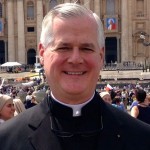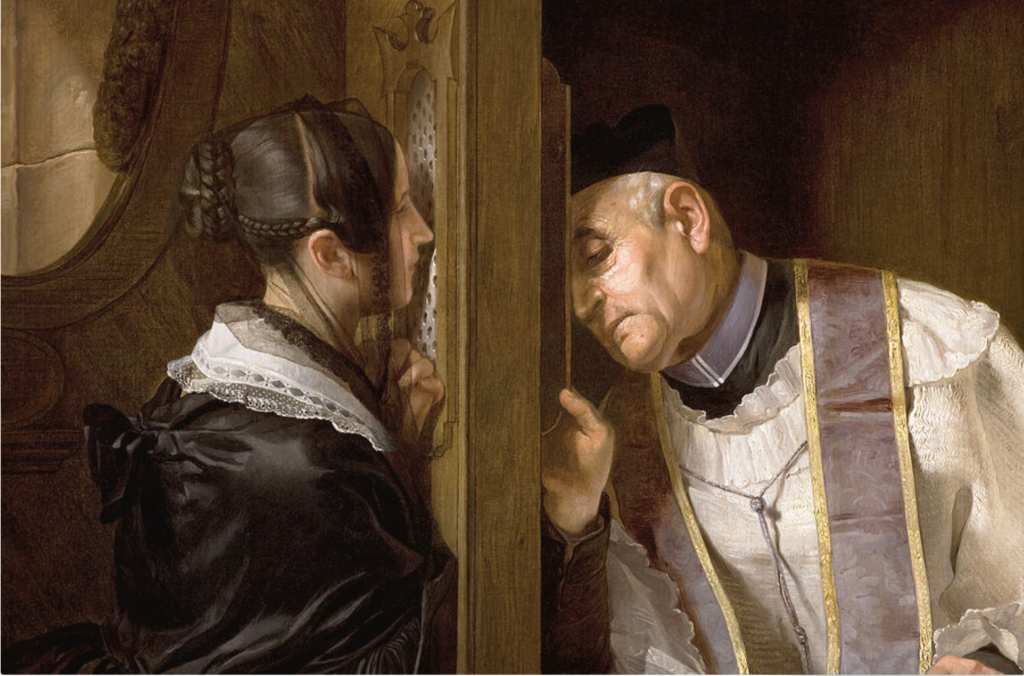
Fr. Gerald E. Murray
The Rev. Gerald E. Murray, J.C.D. is a canon lawyer and the pastor of Holy Family Church in New York City. His new book (with Diane Montagna), Calming the Storm: Navigating the Crises Facing the Catholic Church and Society, is now available.
The situation of the Catholic Church at present is one of grave disorder, due in large part to the willingness of Pope Francis to say, do, and tolerate things that no pope in history has ever said, done, or tolerated.
His recent off-the-cuff remarks instructing priests not to deny absolution to anyone who comes to Confession, for instance. This is in direct contradiction to the teaching of the Church concerning the requisite dispositions required for the valid reception of God’s pardon in the sacrament of penance.
Penitents who, for whatever reason, refuse to repent of the sins they may accuse themselves of in confession cannot be absolved. It would have seemed unthinkable that Pope Francis would say they should be absolved anyway. But he did.
He returned to this theme on his recent trip to Africa. He told the bishops of Congo: “Always. Always forgive in the Sacrament of Reconciliation.” In a similar vein, in 2021, he said that he has never denied Holy Communion to anyone.
Pope Francis wants priests in the confessional to follow his example when they are faced with an unrepentant sinner. In such a scenario, Confession is turned into a meaningless charade. An obstinate sinner should never be given absolution for an offense for which he is not repentant. His refusal to abjure his sins renders him incapable of receiving God’s sacramental pardon.
What is the logic of absolving someone who clings to his sins? The unholy farce of attempting to absolve an unrepentant sinner who intends to keep sinning is a grave violation of the priest’s duty to guide the faithful in Christ’s path of virtue and grace, not the destructive path of sin and spiritual death. Yet that is what Pope Francis told priests they should do.

This moral laxism is accompanied by a regrettable hesitancy to defend, vigorously and publicly, the Church’s teaching on matters of sexual morality when that teaching is openly repudiated by Cardinals, bishops, and priests.
Courageous defenders of the Church’s moral teachings are unfairly vilified as ideologues, Pharisees, rigorists, propagators of rigidity, and “backward.” Critics of those teachings, such as Cardinals Hollerich, Marx, McElroy, Bishop Bätzing. and Fr. James Martin, S.J. are given papal favor and influential roles. There is no meaningful papal rebuke or discipline for their persistent campaigns to overthrow the moral and anthropological teachings of the Church.
No one is being fired for attempting to change the Church’s unchangeable teaching that God created us male and female; that the only morally good use of the sexual faculty is the physical union of man and wife in marriage, in view of propagating the human race in a faithful, loving, and permanent marital bond.
We are incessantly bombarded with propaganda asserting that God made some people with “same-sex” attraction and therefore He must intend for them to act upon their sexual desires; that sodomy is as good and holy a use of the sexual faculty as marital intercourse, and thus unions based on sodomy deserve the Church’s blessing; that God made some people have a male body who is really female, and vice versa.
This intolerable wave of doctrinal error is sweeping over the Church while Pope Francis remains largely passive and silent.
The preparations for the October Synod on Synodality are being determined by the heterodox campaigning of those enjoying papal favor. Instead of discussing ways of defending the Church’s contested moral teachings, those teachings themselves are under assault in the discussions underway.
The hoped-for result of this relentless questioning of doctrines that have always been taught by the Church as unchangeable would be a gradually growing acceptance by the faithful of a supposed need to re-examine whether those teachings really are unchangeable, given the alleged “new world” in which we are living.
Predictable claims about a shift in Catholic public opinion (real or fabricated) will then be followed by a new “Spirit-inspired” proclamation that Catholic teaching was in fact wrong about homosexuality and transgenderism, etc.
“Progress versus reactionary immobilism” is the discussion-ending mantra employed to stigmatize any and all resistance to changing the teachings handed down from the apostles. While the progress of error in the world may indeed be unstoppable in our time thanks to the moral collapse of Western society, this catastrophe has no place in Catholicism.
Tolerance of doctrinal error is not part of the mandate given by Our Lord to St. Peter, and the apostles and their successors. If those successors fail in their duty, they inflict harm upon the faithful. Souls are put at risk by those shepherds who teach men to love sin and reject virtue.
It is completely beyond the power (ultra vires) of any pope, Cardinal or bishop to change the unchangeable moral and anthropological teachings of the Church. It’s false and reprehensible to claim that there are no such things as unchangeable teachings, or that what was considered unchangeable in times past can become changeable in more “enlightened” times.
We are not accustomed to a situation in which opposition to various acts of the pope and his chosen associates is not at all a form of disloyalty, but rather a requirement of fraternal charity flowing from the primordial loyalty owed to God and his revelation by those who serve Jesus Christ in the Church. When error and immorality are propagated by those charged by Christ with refuting error and discouraging immorality, our duty is to call out those shepherds, rebuking them with the charity of truth.
If the Church is to avoid a completely avoidable disaster, the Synod on Synodality must not become a moment of self-destructive questioning of the Church’s teaching on sexual morality and other contested matters. Cardinals and bishops rightly horrified by where they see this process leading should make their protest known to the Holy Father.
Pope Francis’ manifest neglect of his duty to defend the Church’s teaching in the face of grave errors urgently calls for a “tough love,” i.e., intervention in which courageous Cardinals and bishops, setting aside customary politeness and deference, frankly tell the pope that this madness must be stopped. Now.